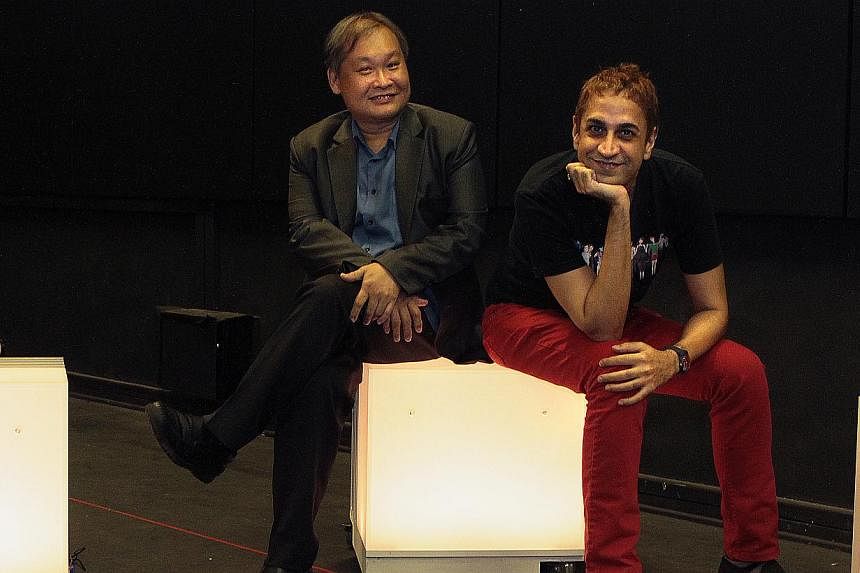Play: Off Centre (first staged in September 1993)
Playwright: Haresh Sharma
What it is about: Two patients meet at the former Woodbridge Hospital: Vinod, a straight-A student and articulate school debater with severe depression whose high-flying parents are distant; and Saloma, a withdrawn vocational student wrestling with schizophrenia who has a poorly educated but caring mother. Off Centre paints an honest, unflinching look at how the mentally ill are regarded in Singapore and how far society has to go to give them acceptance and support.
In early 1993, playwright Haresh Sharma, director Alvin Tan and several of Off Centre's cast members visited a halfway house, one of several that act as a bridge to help those with mental illnesses settle back into their communities.
"There was this mousy girl," Sharma, 50, recalls, "She sat down and started talking to me and asking me to help her because she wanted to go home, but the social worker said that she couldn't and her mother was worried about her, and could I do something about it?
"I felt really bad and guilty and I just said - I will try to talk to the social worker and see what I can do."
Don't be fooled, the social worker told him later. It turned out that the girl had a form of schizophrenia and had been trying to get him to side with her. Sharma's interaction with this girl formed a large part of the inspiration for the main character of Saloma, played with enormous pathos by Sakinah Dollah.
The Ministry of Health had commissioned The Necessary Stage to create a production that was "less didactic or formulaic", as Sharma puts it, than their previous "public service" playlets.
The group knew that in-depth, face-to-face research was crucial in bringing a sense of authenticity to the work and was excited by the access they would have to caretakers, doctors, social workers and patients at the former Woodbridge Hospital and other organisations.

Over nine months, the cast and creative team went for art therapy classes, did group improvisations on the effects of stress on individuals and read up on case studies and news articles.
"It was the first time TNS had engaged in such a long process in putting up a play. The result was most satisfactory," Sharma notes in one of the printed editions of the script. Through these interactions, the group tried to build up an accurate picture of how people with schizophrenia and depression would respond to those around them and how they might behave.
It is well known for its devising methodology, where every member of the production is involved in creating the script, not only its playwright and director. "This is not a process for a faint-hearted cast and director or for a writer precious in protecting his words," academic David Birch noted in his 2004 essay on the group's collaborative methods.
Off Centre's lead actor Abdul Latiff Abdullah, 47, now an educator, remembers how he and fellow leading actress Sakinah - they are now married - were sent on a trip down Scotts Road "in character". They had to do a series of simple tasks, such as open a bank account or buy jewellery, while playing an uncomfortably garrulous Vinod and an intensely emotional Saloma.
"People look at you very differently," he says, "I really don't blame the kind of responses we got because it really is odd. People are generally not very patient... they generally tend to be suspicious of characters who seem 'off centre'. You don't get a second chance."
The play was staged at the height of a National Productivity Campaign, and this sense of busy-ness filtered into the show, painting a picture of a society that did not have time to deal with those on the margins.
"We had to incorporate these elements into the play and we didn't want to sugarcoat it," Sharma adds. "For one person who does well, there's another who does not. That's the reality."
Little did the theatre company know that it had embarked on what would be an arduous, rollercoaster journey. The Health Ministry had pledged $30,000 in sponsorship to create a production that would "encourage adoption of a lifestyle that will promote good mental health".
But when the group submitted its script in June 1993, The Straits Times reported that "the ministry found the play not in keeping with its original aims and requested technical changes. When Haresh Sharma refused to make these changes, the commission was withdrawn".
The head of public affairs at the Ministry of Information and the Arts was quoted as saying: "The script of Off Centre did not put across the message that the ministry had in mind. It presented a prejudiced view of mental disorder, its treatability and the therapists, besides ridiculing God, religion and national service."
There is an edge of residual indignance in Sharma's voice when he discusses this. He wrote a letter to the ministry to explain that, among other things, various army characters had reacted to Vinod differently, some supportively and others disparagingly, that religion might not have assured some characters, but definitely gave others genuine reassurance. In short, "negative characters in a play do not make a play negative... portraying a rosy picture of 'happily ever after' simplifies a complex problem".
Abdul Latiff echoes this: "I think all of us agreed, along with Haresh and Alvin, that the play would have lost a lot of its impact if we had compromised and censored some of the parts." This included a brief scene of nudity, for which the theatre company had already given itself an R(A) rating. As a result, the play seemed at the time confrontational. Arts journalist Clarissa Oon wrote in a 2004 essay: "The 'voice' of the mental patient sets the tone for what is a direct confrontation between the individual and the institutional, authoritarian structures, in which the play's audience is implicated".
The company went ahead with the staging and the show garnered a flurry of stellar reviews, leaving some audience members in tears and lining up to hug Saloma (Sakinah).
Tan leafs through a thick folder of letters received from people from all walks of life in response to the play. The late pioneering counsellor Anthony Yeo, director of Singapore's first counselling centre, sent a warm, effusive letter to several newspapers praising the production, and its "careful adherence to factual information throughout".
Despite the difficulties the company faced in mounting the show the first time round, it was almost immediately requested to perform at Singapore's first Mental Health Awareness Week in 1994.
Off Centre cemented the company's strong socially conscious streak, but was not the end of its tussles with the authorities. The bureaucractic push-pull that the company had experienced would also affect other groups in the years to come as various ministries and statutory boards, such as the then-newly minted National Arts Council, ironed out questions of arts regulation and censorship.
A year later in 1994, TNS would find itself embroiled in a nightmarish Marxist scandal, after this newspaper reported that Tan and Sharma had attended workshops on forum theatre and drama therapy in New York conducted by theatre practitioner Augusto Boal, a Brazilian Marxist. The implication was that the group was using theatre as a political tool and it narrowly avoided closing down.
But in 2006, Off Centre became the first Singaporean play to be studied as an O-level literature text, to be read by thousands of students. Tan, 51, was shocked and delighted when he first heard the news: "I thought it was going to happen after my lifetime."
Off Centre will be restaged in April as part of the Esplanade's Studios season of 50 notable local plays, directed by award-winning theatre practitioner Oliver Chong, who has been diagnosed with mild schizophrenia himself.
As a former literature teacher, Abdul Latiff taught the text to some of his students and has taken them on field trips to the Institute of Mental Health to understand the play's content and context better.
"It's something that will never leave us," Abdul Latiff says of himself and Sakinah. "We still talk about it now and then. We appreciated the opportunity because it really opened our eyes... I continue to be moved when I read it and particularly when I watch it. It was really something quite out of the ordinary."
Follow Corrie Tan on Twitter @CorrieTan
Off Centre is available at public libraries, major bookstores and The Necessary Stage. Different editions cost between $10.70 and $19.
The next instalment of this 15-part series will be published at the end of next month.



